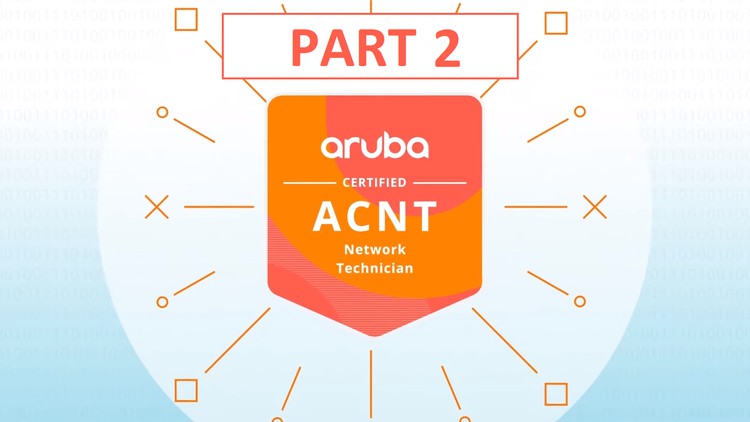
After completion two parts, the candidate will be ready to take the Aruba Certified Network Technician (ACNT) exam.
What you will learn
Perform Numerical Conversions
Do initial switch setup
Configure IPv4 Routing
Monitor a WLAN and wireless client
Analyze Packets
Configure VLANs and 802.1Q
Deploy a WLAN
Description
This course provides an easy entry point to the world of computer networking. It is geared towards students who are new to technology and/or college students. This introductory course covers the different aspects of campus access both wireless and wired methodologies. After completion of the course, the candidate will be ready to take the Aruba Certified Network Technician (ACNT) exam.
Part 1 covers these topics:
- Networking Fundamentals
-
- Basic Network Concepts
- What is a Computing Network?
- Network Classifications
- What is a Protocol?
- OSI Reference Model
- Encapsulation/ Layer Headers/ PDUs
- Physical media, cables
- Binary Numerical System
- Hexadecimal Numerical System
-
- TCP-IP
- Overview
- include how a collaboration tool (Zoom, Teams) works from a networking perspective.
- TCP/IP Stack
- Ethernet, Ethernet Frame
- IPv4 header
- TCP Header – Three-way handshake, sequence numbers, port numbers
- UDP Header
- Networking Devices – Switches, Routers, Multilayer Switches, APs, Firewalls and Servers
- Networking Services – DHCP, DNS, HTTP, Telnet and SSH, FTP
- Overview
- Basic Networking with Aruba Solutions
- Network Design
- Hierarchical Models
- Aruba Switching Portfolio
- Modern Switching Requirements
- AOS-CX features, commands
- VLANs
- Collision Domain
- Broadcast Domain
- Virtual LAN
- Access Ports
- 802.1Q & Trunk Ports
- Forwarding Tables (MAC and ARP)
- Frame delivery
Part 2 covers these topics:
- IPv4 Routing
- IPv4 Addressing
- Network Mask
- Routing Introduction
- Default Gateway
- Inter-VLAN Routing
- IP Routing Table
- Packet Delivery
- WLAN Introduction
- Networking Comparison: Wired vs Wireless
- WLAN Organizations
- Radio Frequency Communications (Antenna types, 802.11 Standards, and Sources of interference)
- Data Rates
- WLAN Theory
- Terminology
- Roaming
- WLAN Architecture
- Coverage
- WLAN Security
English
language
Content
Introduction
Introduction
Module 5: Internetwork Communications
Routing and IPv4
Host Routing Table vs Host Default Gateway
Routers and Multi-Layer Switches
Static Routes and Default Routes
IPv6 Addressing
Quiz
Lab 5
Module 6: WLAN Fundamentals
Introduction
802.11 Standards and Amendments
RF Communications
Antenna Technology
RF, Mobility and Frame Types
Quiz 6
Lab 6
Module 7: Configuring APs using Aruba Central
Aruba Central Introduction
Central Groups
Configuring an AP and Monitoring Using Central
Quiz 7
Lab 7